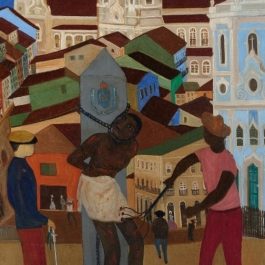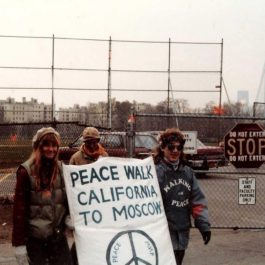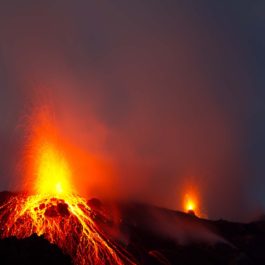CenSAMM Annual Conference (23-24 September 2025): Apocalypticism in Modern Britain
This year, the CenSAMM annual conference will take place at the University of Cambridge, 23-24 September 2025.
The conference will investigate apocalypticism, apocalyptic language, and millenarian movements in modern Britain, though papers on wider contextualisation will also be considered. The chronological period is the twentieth and twenty-first centuries. The conference welcomes presentations and participants from across disciplines and fields, including history, literary studies, anthropology, sociology, religious studies, biblical studies, art history, film studies, and political sciences. Terms such as ‘apocalypticism’ and ‘millenarian’ are understood broadly to include (for instance) interrelated ideas of transformation of the existing order, a predicted golden age (or not), revelation, spiritual warfare, and prophecy, whether cast in religious or secular language.
The conference will be livestreamed. To sign up for livestreming, please contact the Director of CenSAMM.
Call for Papers: Anglo-Israelism and the British Imperial Imagination
This symposium aims to bring together scholars with research interests in Anglo-Israelism, Christian Zionism, and British Imperial History with the aim of considering the influence of Anglo-Israelism on the trajectory of the British Empire and its modern legacy, as well as the role of biblical thinking in the modern world.
Academics working within these and related areas are invited to propose papers as the basis for discussion within the symposium, which will take place at the Centre for the Critical Study of Apocalyptic and Millenarian Movements (CenSAMM) in Bedford, UK, on February 22-23, 2024.
Apocalyptic Nostalgia? Cold War Imagery in Popular Culture
Thursday 13th July 2023 at Imperial War Museum North, Manchester, UK.
Deadline for submissions: Tuesday 28th February 2023.
This conference invites participants to explore the complexities of encountering Cold War imagery within popular film, television, video and tabletop games, music, graphic novels and social media content. In particular, it aims to examine the way in which this imagery impacts understandings of the apocalyptic and post-apocalyptic within popular culture.
See the conference page for more information.
Next Quest for the Historical Jesus Conference
The Next Quest for the Historical Jesus conference will be both virtual (11 July) and hybrid (15–16 July), with the in-person event happening at the Higgins Art Gallery & Museum, Bedford.
The conference is free and registration is now open.
See the main conference page for details and updates.
Annual Conference 2022: The Study of Apocalyptic and Millenarian Movements
The CenSAMM Annual Conference 2022 will be held online during 7-8 July 2022.
The theme is: The Study of Apocalyptic and Millenarian Movements: Critical and Interdisciplinary Approaches.
We invite individual paper proposals from scholars at all stages of their careers, and we welcome suggestions for group panels.
Deadline for proposals: 29 April 2022
See the main conference page for full details.
The Study of Apocalyptic and Millenarian Movements
The Centre for the Critical Study of Apocalyptic and Millenarian Movements (CenSAMM) is pleased to announce its 2021 conference, to be held online 29 June to 1 July 2021.
The theme of the conference is: The Study of Apocalyptic and Millenarian Movements: Critical and Interdisciplinary Approaches.
See the main conference page for more information
Invited speakers include:
Kelly Baker (independent scholar and author)
Ipsita Chatterjea (SORAAAD, University of Regina, Canada)
Lorenzo DiTommaso (Concordia University, Canada)
Paul Middleton (University of Chester, UK)
Rachel Wagner (Ithaca College, NY)
Deadline for proposals: 30 April 2021
Apocalypse and Utopia, 1914-1945
While the apocalyptic resonances of the great global conflicts of the twentieth century are well known, the continuity and convulsion in social, political and wider cultural understandings of apocalypticism and utopic idealism across the span of the World Wars and the interwar years has received only limited academic attention. This online symposium explored the evolution of existing and the emergence of new apocalyptic and millenarian thinking, groups, and movements during the period from the outbreak of the Great War in 1914, through the interwar period, and up to the end of World War Two in 1945.
Following the event, participants were invited to submit short video-podcasts summarising their papers, these are made available on the symposium page as they come available.
Video Games and Religion: Apocalypse and Utopia
With the growth of scholarly interest in the religious and theological tropes encountered in video games, there is a developing awareness of the special valence of apocalypticism, millenarianism, and associated themes in video game narratives and gameplay. This virtual symposium invited academic explorations of the role of apocalypse and utopia in video games and welcomed discussions of a wide-range of approaches to ultimacy and cosmic destiny in video games.
Following the event, participants were invited to submit short video-podcasts summarising their papers, these are made available on the symposium page as they come available.
Apocalypticism and Millenarian Movements in the Ancient World
Since the 1970s the study of apocalyptic literature, apocalypticism, and millenarian movements in the ancient world has received a remarkable amount of scholarly attention from experts working on a range of material from different historical, literary and cultural contexts. The aim of this online symposium is to bring together researchers working on these interrelated approaches and to generate discussion across academic fields.
Please see the main symposium page for more information.
The Cold War and the End Times: Apocalyptic and Millenarian Themes in Politics, Society and Culture, 1946-1989
As scholarship extends understanding of the complex interaction of religious thinking and the Cold War, this one-day virtual symposium brought a particular focus to apocalyptic and millenarian aspects of these discourses during the period between Churchill’s coining of the “Iron Curtain” and the fall of the Berlin Wall.
Following the event, participants were invited to submit short video-podcasts summarising their papers, these are made available on the symposium page as they come available.
The Study of Apocalyptic and Millenarian Movements 2020
Very sadly, because of the current coronavirus pandemic we have had to take the decision to cancel the CenSAMM 2020 annual conference.
The Centre for the Critical Study of Apocalyptic and Millenarian Movements (CenSAMM) is pleased to announce its 2020 annual conference, to be held at the University of Bedfordshire UK (Bedford Campus) 29-30 June 2020. The theme of the conference is: The Study of Apocalyptic and Millenarian Movements: Critical and Interdisciplinary Approaches.
The Study of Apocalyptic and Millenarian Movements 2019
The Centre for the Critical Study of Apocalyptic and Millenarian Movements (CenSAMM) first annual conference was held at the University of Bedfordshire (Bedford Campus) 27-28 June 2019.
A conference report for the 2019 conference is available here.
The aim of the annual conference is to facilitate critical and interdisciplinary discussion of apocalypticism, millenarianism and associated movements across time, place, and culture, and will cover academic fields such as anthropology, archaeology, biblical studies, critical theory, cultural studies, history, literary studies, political studies, psychology, religious studies, sociology, etc. The interdisciplinary scope is broadly understood to include methodologies, comparative approaches, and showcasing of research more specific to individual fields of expertise.
Speakers in 2019 included:
John J. Collins (Yale Divinity School)
Vanessa Harding (Birkbeck College, University of London)
Bill McGuire (University College London)
Sarah Rollens (Rhodes College)
Beth Singler (University of Cambridge)
Fatima Tofighi (EUME, Berlin/University of Religions, Qom)
Paul-Francois Tremlett (Open University)
Natural Disasters and Apocalypse 1500 - Present (Sept 13, 2018)
The conference timetable is available for download.
Since the early modern period, societies located in different parts of the planet have experienced natural disasters. Ranging from earthquakes to volcanic eruptions, from flooding to tidal waves, communities have variously responded to unpredictable and catastrophic natural events.
Strategies of human resilience to shattered urban and rural territories were undertaken against a backdrop of cultural responses to trauma caused by natural disasters. Located within a variety of contexts (notably religious, political and socio-economic), natural disasters have usually modified collective perceptions of the world, time, and the position of humans in history. Within a millenarian context, natural disasters have often been interpreted as a prelude to the end time. From a political angle, natural disasters have been seen as the solution to a dystopian world characterized by political ineptitude, moral decay and unsustainable inequality. Similarly, within a religious context, natural disasters have often been interpreted as rooted in the relationship between humans and the divine. Thus, disasters have been interpreted as the first manifestation of divine judgement against human misconduct, and as a prelude to the apocalypse.
This conference seeks to explore the different forms through which the idea of natural disasters and the apocalypse has taken shape in geographically distant and culturally different societies from the early modern period to the present.
Apocalypse in Art: The Creative Unveiling (June 28 & 29, 2018)
View the archived presentations here
The word ‘apocalypse’ originally indicated an ‘unveiling’, and the speaker in the Book of Revelation is a ‘seer’. This is perhaps one of the reasons that this ancient text (and others like it) have generated such a ferment of creative responses in the visual arts – as well as those other non-visual strands of the arts which have their own way of engaging our mind’s eye.
The rich variety of types of artistic unveiling (visual, musical, dramatic, literary) makes an engagement with the creative arts a deeply valuable way of understanding and appreciating the idea of apocalypse, alongside more traditionally academic modes of enquiry.
This conference seeks to explore our relationship to art, its practice, its study and what the arts unveil to us. As artists or as audiences of art we can be profoundly transformed by our encounters with artistic creativity; indeed, we can find ourselves using the language of revelation to describe such encounters, regardless of our individual faith, religion or beliefs. Mark Rothko is quoted as saying, “the people who weep before my pictures are having the same religious experience I had when I painted them.”
AI and Apocalypse (April 5 & 6, 2018)
View the archived presentations here
Recently ‘AlphaGo’, a Google/Deepmind programme, defeated the two most elite players at the Chinese game ‘Go’. These victories were, by current understandings of AI, a vast leap forward towards a future that could contain human-like technological entities, technology-like humans, and embodied machines. As corporations like Google invest heavily in technological and theoretical developments leading towards further, effective advances – a new ‘AI Summer’ - we can also see that hopes, and fears, about what AI and robotics will bring humanity are gaining pace, leading to new speculations and expectations, even amidst those who would position themselves as non-religious.
Speculations include Transhumanist and Singularitarian teleological and eschatological schemes, assumptions about the theistic inclinations of thinking machines, the impact of the non-human on our conception of the uniqueness of human life and consciousness, representations in popular culture and science fiction, and the moral boundary work of secular technologists in relation to their construct, ‘religion’. Novel religious impulses in the face of advancing technology have been largely ignored by the institutions founded to consider the philosophical, ethical and societal meanings of AI and robotics.
This symposium seeks to explore the realities and possibilities of this unprecedented apocalypse in human history.














